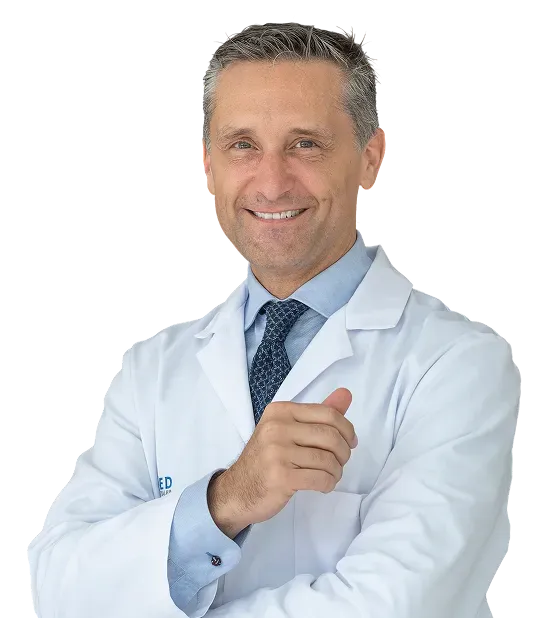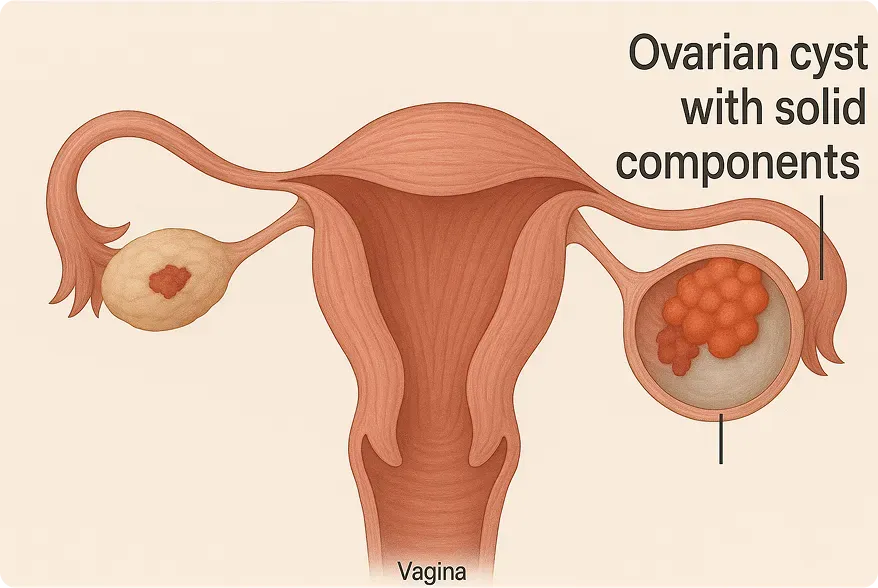DISEASES
Complex Ovarian Cyst Management in Valencia
Minimally Invasive Cystectomy & Personalized Fertility-Preserving Care — Trusted by Women Worldwide
Dr. Lucas Minig — Expert in highly complex Gynecologic Surgeries & Fertility-Focused Specialist

Facing a Worrying Ovarian Cyst? Get Clear Answers—Fast
Hearing that your cyst has solid areas or internal septations can feel overwhelming. In that moment, a flood of questions can surface—about your fertility, your future, and what comes next.
We’re here to give you answers that are fast, clear, and centered on you.
You’ll understand:
- What the cyst means for your reproductive health
- Whether it’s safe to monitor or if surgery is recommended
- How we can protect your ovarian function and long-term well-being
At our center in Valencia, we act swiftly—completing ultrasound, blood work, and, when needed, a minimally invasive laparoscopic cystectomy within a week in over 95% of cases.
You’ll leave with clarity, confidence, and a care plan designed to preserve your health—not disrupt your life.
International patient welcome
Whether you’re in Europe, North America, or beyond, our clinic offers:
Tele-Consultations in English, Spanish and Italian
Concierge Travel Assistance for visas, lodging, and local transportation
Flexible Scheduling to accommodate your time zone

What Are Ovarian Cysts with Solid Components?
Ovarian cysts are fluid-filled sacs that form on or inside the ovaries. Most are harmless and go away on their own.
But when a cyst contains solid tissue, blood, or thick fluid, it’s called a complex cyst. These are less likely to disappear naturally and may cause ongoing pain, pressure, or bloating.
In some cases, complex cysts need closer monitoring or removal—not just to ease symptoms, but to rule out rare but serious conditions like ovarian cancer.
Finding one doesn’t mean you have cancer—it means it’s time to look more closely, so you can make informed, empowered decisions about your health.
Recognize the Signs
Not all ovarian cysts cause symptoms—or require surgery. Many resolve on their own. But some can grow, twist, or press on nearby organs, leading to discomfort or disruption in your daily life. If something feels off, it’s worth paying attention.
Here are common signs to watch for:
- Pelvic Pain or Pressure
A dull ache, a heavy feeling, or sharp twinges on one side of your lower abdomen—especially during your cycle or after activity. - Bloating or Fullness
Feeling unusually full, even after small meals, or noticing visible abdominal swelling can be a sign the cyst is growing or pressing on surrounding tissue. - Pain During Sex
Discomfort with deep penetration may signal a cyst pressing on internal structures or triggering inflammation. - Frequent Urination
When a cyst sits close to the bladder, it can create a constant urge to urinate—even if your bladder isn’t full. - Changes in Menstrual Patterns
Heavier, lighter, or irregular periods may be linked to hormonal shifts caused by the cyst.
If these symptoms persist or disrupt your life, it doesn’t always mean surgery—but it does mean you deserve answers. The first step is gentle evaluation, not alarm.
Who’s at Risk
Ovarian cysts are common—and most are harmless. But some people have a higher chance of developing complex or persistent cysts that need closer monitoring. Understanding your risk helps us personalize your care and avoid unnecessary intervention.
We take special care when you have:
- Hormonal Imbalances (like PCOS)
Polycystic Ovary Syndrome can lead to multiple small cysts forming on the ovaries and may cause irregular cycles, acne, or unwanted hair growth. - Endometriosis
Endometriosis can lead to endometriomas—cysts filled with old blood often called “chocolate cysts.” These can grow large and cause chronic pelvic pain. - History of Ovarian Surgery
Scar tissue or changes in ovarian structure may affect how cysts form or resolve over time. - Family History of Ovarian Disease
While most cysts are not cancerous, a strong family history of ovarian or breast cancer may increase your long-term risk and guide how we monitor changes. - Life Stage (Puberty to Perimenopause)
Hormonal fluctuations during these transition phases can increase cyst formation—often benign, but sometimes worth a closer look if symptoms persist.
Your Personalized Care & Multidisciplinary Pathways
Your Personalized Care Pathways
Every cyst—and every person—is different. That’s why your care plan is never one-size-fits-all. We consider your symptoms, reproductive goals, and peace of mind to guide each decision, step by step.
We personalize every step — whether you are local or traveling from overseas. Our team coordinates closely with international patients to minimize travel stays and ensure fast, streamlined care.
No two people—and no two diagnoses—are exactly the same. That’s why we take the time to understand your stage, your goals, and your vision for the future, including fertility and quality of life. You are not a case—you are a person. And your care plan will reflect that.
-
Watchful Monitoring & Symptom Relief
When the cyst appears benign, we often start with careful observation and support.- Follow-up ultrasound at 6–8 weeks to track changes
- Pain management and hormonal regulation (e.g., birth control pills) to reduce recurrence
-
Ovary-Sparing Cystectomy
If intervention is needed, we prioritize preserving your ovary whenever possible.- Laparoscopic removal of the cyst, leaving healthy ovarian tissue untouched
- Robotic-assisted techniques available for challenging or deep-seated cysts
-
Adnexectomy (Rare)
In rare cases, if the cyst can’t be safely separated or if cancer is confirmed, removal of the ovary and fallopian tube (adnexectomy) may be necessary.- Full fertility counseling provided before any decision is made
- We’ll explore egg preservation, IVF, and other reproductive options with you—compassionately and thoroughly
“If motherhood is part of your vision, we’ll explore every evidence-based option to support that dream.”
Recovery & Beyond
Days 0-1
Urinate by yourself. Walking. Hospital dishcarge by Dr Minig in-person
Days 1-15
Progressive home recovery; virtual follow-up. Day 10 - 15: travel to your city/country
Weeks 2–4
Normal activities resume according with level of pain; discomfort fades.Back to work. virtual follow-up.
Months 1–3
Back to full rutine, including work and excercises. virtual follow-up...
Ongoing
Annual ultrasounds help monitor for recurrence
Why choose Dr. Minig & our team
Extensive specialized oncology training in the main medical centers in Italy and the United States
- 20+ Years’ Expertise in advanced gynecologic surgery
- > 95% Minimally Invasive Rate for cyst removal
- Fertility-First Focus—ovary preserved in nearly 95% of cases
- Comprehensive Support—surgical, medical, nutritional & emotional care
- Industry-Leading Research & Innovation
- Global Reach: Personalized logistical support for international patients
“Dr. Minig saved my dream of motherhood with skill and compassion.”
— Isabel G., Valencia

International patient welcome
Whether you’re in Europe, North America, or beyond, our clinic offers:
Tele-Consultations in English, Spanish and Italian
Concierge Travel Assistance for visas, lodging, and local transportation
Flexible Scheduling to accommodate your time zone
Frequently asked questions
Can medication dissolve a complex cyst?
No—only surgery definitively resolves these cysts.
Will I lose my ovary?
Almost never. Our ovary-sparing techniques remove only the cyst.
How does surgery affect fertility?
By preserving healthy tissue, most women keep their ovarian function intact.
Ready for Clear Answers & Fertility-Preserving Care?
Discover how minimally invasive cystectomy in Valencia can protect your ovarian reserve and your future.
Request Consultation or Second Opinion

Next Steps
More than a clinic — we are your international partner in healing.
With virtual consults, fast-track scheduling, and full travel support, we make Valencia ovarian cyst surgery seamless — wherever you live.
